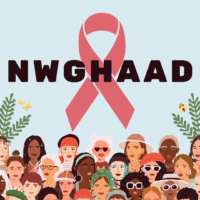National Women and Girls HIV/AIDS Awareness Day (NWGHAAD)
This post was written by Steven Proutsos, an AmeriCorps fellow serving on our AIDS Legal Council (ALC) team.
—
HIV does not discriminate by age, sexuality, or gender identity—it can impact everyone; however, certain communities—especially women and girls—are often excluded from the conversation regarding HIV. March 10 is National Women and Girls HIV/AIDS Awareness Day (NWAGHAAD), a day to increase education around and show support for women and girls impacted by HIV/AIDS. By increasing awareness, days like NWAGHAAD play an important role in increasing prevention, testing, and care for women and girls both at risk for and currently living with HIV/AIDS. Legal Council for Health Justice is committed to our nations fight to end the HIV epidemic, both through advocacy and direct client services, to relieve the social determinants impacting women with HIV/AIDS.
Current data on HIV infections demonstrates the prevalence of HIV/AIDS among women and girls—particularly Black women. In the United States in 2021, women (those assigned female sex at birth) accounted for almost 20% of new HIV diagnoses, with transgender women composing around 2% of new diagnoses. Although HIV diagnosis rates among women have decreased in recent years, in turn, new patterns of inequity have been revealed: Although, in 2021, about 14% of all women in the United States were Black, Black women comprised over half of all new HIV diagnoses among women. Similarly, in the same year, Latinx women made up a quarter of new HIV infections while representing less than 20% of all women in the United States. And, unfortunately, disparities in diagnoses are not the only ones that exist for women with HIV: in 2020, Black women had the lowest rates of viral suppression among women with HIV (HIV.gov). “Viral suppression” in someone with HIV means their viral load is low enough to prevent transmission of HIV to another individual and is critical in ending the HIV epidemic, but inequitable access to treatment precludes the ability to reach viral suppression. At Legal Council, we are keenly aware of the role racism, stigma, homophobia, and poverty play in driving these disparities—disparities that exemplify a drastic need for advocacy to reduce the barriers to healthcare impacting women of color in the United States.
HIV.gov announced that the theme for 2024 NWAGHAAD is “Prevention and Testing at Every Age. Care and Treatment at Every Stage,” emphasizing the need for a holistic approach in our efforts to reduce the spread of HIV in women and girls. Research shows unstable housing conditions, lack of perceived social support, and financial dependency as promoting HIV risk behavior, such as lack of testing and sharing of needles (Frew et al.) . Medical Legal Partnerships (MLPs) like those Legal Council operates within form safe spaces by connecting women with medical professionals, social workers, and legal aid who help promote access to health information and testing surrounding HIV, social connection to develop coping strategies to protect well-being, and enhanced legal literacy to relieve health-harming legal needs. MLP’s can aid clients in obtaining access to stable housing in drug-free and violence-free neighborhoods, which can increase a person’s ability to stay engaged in ongoing healthcare, as well as assisting in applications for public benefits that can provide financial safety nets such as Social Security Insurance.
This NWAGHAAD, we must recommit to addressing the socioeconomic factors that increase risk of HIV among women and girls, particularly those of color, and lean on strategies that we know work, like MLPs and community engagement. While new cases of HIV in women and girls have declined over the years, there is still an imminent need to address the socioeconomic factors that decrease quality of life and increase HIV risk. Ultimately, partnering community-based organizations in the form of MLP’s will continue to create a multifaceted approach in facilitating the development of effective interventions that will decrease HIV risk while empowering women living in these communities. Legal Council will continue to serve our community while also working in collaborative efforts with other MLP’s and community members to address issues impacting women and girls at-risk or living with HIV/AIDS so they can live their healthiest, happiest lives.

